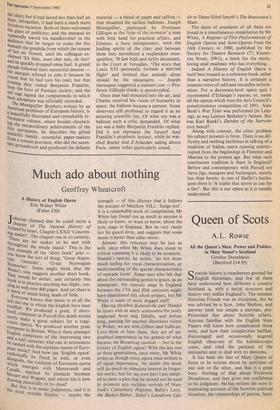Much ado about nothing
Geoffrey Wheatcroft
A History of English Opera Eric Walter White (Faber £30)
Johnson claimed that he could recite a
chapter of The Natural History of Iceland by heart, Chapter LXXII 'Concern- ing snakes'. The chapter ran in its entirety, 'There are no snakes to be metwith
i throughout the whole island.' This is the first example of the `short book' joke —. Y.01-1 know the sort of thing, 'Great Argen- tine Generals', 'Great Norwegian Humorists'. Some might think that Mr White's title suggests another short book. That would be unfair, and certainly this nin b.00k is in practice anything but slight, run- g to well over 400 pages. And yet there is a sense of much being made of little.
Everyone knows that music is of all the arts the one in which the English have least l iv
e.xeelled. We e produced a great, if short- ed, composer in Purcell (his death would surely make a good subject for a tragi- comic opera). We produced another great c°111Poser in Britten. Who is there amongst English composers of the intervening two and a half centuries who can in seriousness be ranked with the supreme names of Euro- pean Music? And how can 'English opera' realistically be fitted in with, alongside, or even
the tradition of European opera Which emerged with Monteverdi and Cavalli, reached its pinnacle between M. ozart and Wagner, and whose life is now drawing peacefully to its close? But that is to make judgments, the most notable feature — and it is maybe the strength — of this History that it follows the precept of Matthew VII,i: 'Judge not'. It is a remarkable .work of compilation; Mr White has found out as much as anyone is likely to know, or want to know, about the lyric stage in England. But he very rarely lets his guard drop, and suggests that some music is better than other music.
Almost: this reticence may be just as well, since when Mr White does stoop to critical comment it is likely to be eccentric. Handel's operas, he writes, `do not show much feeling for vocal characterisation, or understanding of the special characteristics of operatic form'. Some men who felt that about the outstanding genius to grace, as an immigrant, the operatic stage in England between the 17th and 20th centuries might have abandoned this whole project, but Mr White is made of more dogged stuff.
Having plodded dismissively past Handel he treats with as much seriousness the justly neglected Arne and Dibdin, and before long, pausing for another illustrious visitor in Weber, we are with Gilbert and Sullivan. Love them or hate them, they are of un- doubted importance in the genesis of what became the Broadway musical — but in the history of English opera? With the last two or three generations, once more, Mr White writes as though every opera once written is of equal importance. No doubt this book will do much to stimulate interest in forgot- ten works, but for my own part I am tempt- ed to enter a plea that he should not be used to promote any reckless revivals of Stan- ford's Canterbury Pilgrims, Balfe's Letty, the Basket-Maker, Hoist's Lansdown Cas- tie or Dame Ethel Smyth's The Boatswain's Mate.
The dates of premieres of all these are found in a simultaneous compilation by Mr White, A Register of First Performances of English Operas and Semi-Operas from the 16th Century to 1980, published by the Society for Theatre Research (77, Kinner- ton Street, SW1), a book for the music- loving anal madman who has everything.
Indeed A History of English Opera is itself best treated as a reference book rather than a narrative history. It is certainly a treasure-trove of odd and recondite inform- ation. For a doctorate-level opera quiz I recommend d'Erlanger's operas; or, name all the operas which won the Arts Council's pseudonymous competition of 1951. Alan Bush's Wat Tyler was performed (in Leip- zig), as was Lennox Berkeley's Nelson. But was Karl Rankl's Deirdre of the Sorrows ever heard?
Along with content, the other problem his subject presents is form. There is no dif- ficulty and nothing factitious in talking of a tradition of Italian opera running uninter- rupted from the beginnings in Florence and Mantua to the present age. But what such continuous tradition is there in England?
Before and contemporary with Purcell are farce jigs, masques and burlesques, mostly less than heroic: in one of Duffet's burles- ques there is 'A triplet that serves as cue for a fart'. But this is not opera as it is usually understood.


































 Previous page
Previous page